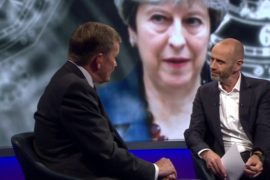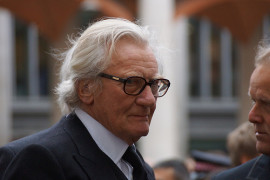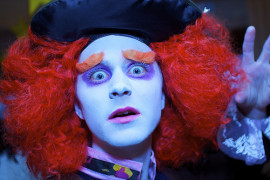Scenting Tory blood, the BBC cranks up its anti-Brexit propaganda. That was the conclusion I reached at the end of the BBC’s shameless last week of anti—Brexit coverage a year on from the referendum victory. The Tories’ election debacle appeared to have given them carte blanche to revolt.
Now they have declared all-out war. Last night on Newsnight Evan Davis used that time-honoured tactic to justify what is clearly now the BBC’s official stance. He rewrote history – in this case the very recent history of the election result.
In an aggressive and rude interview with David Jones MP – a minister in the Brexit department until the election – Evan Davis asserted as a fact that the ‘Theresa May plan for Brexit’ was one ‘which clearly didn’t grab the population in the election’. How he was party to this knowledge we were to find out.
“I don’t think it was that,” Jones immediately countered, “I think frankly the big issues were other non-Brexit-related issues, most particularly the issue of social care but also one or two other issues too. But I think so far as Brexit is concerned, we are now in the position where 80 per cent of the electorate of this country voted for parties who want to take Britain out of the EU.
To which our insolent BBC apparatchik replied: “Sorry, what planet are you on?
“Loads of swing voters who might have voted Tory voted for Jeremy Corbyn’s Labour Party because they so detested the Theresa May version of Brexit. Metropolitan, liberal Remainers . . .”
Yes, of course, this was why the swing voters voted for Corbyn!
Quite rightly, Mr Jones retorted: ‘I don’t see how you can …’ but before he could finish, Evan bulldozed over him: “….We cannot vote for Theresa May because we don’t like her Brexit . . .’ This was his theory of the election result and that was that.
David Jones once more attempted to question this thesis: “I don’t see how you can possibly read that into the election result – 80 per cent of the population voted for parties that clearly support Brexit.”
No, they didn’t – not at least according to Newsnight’s mind reader: “ … the polls show more people didn’t like her version of Brexit than did like her version of Brexit. You can’t say that anybody who voted Labour was endorsing Theresa May’s Brexit, because they voted for a party . . .”
Mr Jones tried again, once more to be ridden roughshod over.
Davis was not letting go of his cherished theory: “But hang on, you were saying if somebody voted Labour they were effectively endorsing Theresa May’s Brexit and that is completely untrue isn’t it? They voted Labour as a protest against Theresa May’s Brexit.”
If that is not a fake fact I am not sure what is.
The valiant David Jones had one more go: “Well, I don’t see how you can possibly read that into it”.
And guess what, Evan couldn’t wait to explain to this poor idiot Tory what was going on in the mind of the man on the Clapham omnibus on the way to vote (according the Book of Evan, and the Holy Gospel of the BBC, that is). It was, he avowed:
“Because they thought they’d get a softer Brexit from Labour and potentially stay in the customs union, because they thought it was bonkers to leave it.”
Is that so? How many voters I wonder would have passed a quick test outside the polling booth on exactly what the customs union is?
You have to be quick with your repartee if you are not going to be a lamb for the slaughter on the BBC. By now poor Mr Jones, like a torture victim who manfully keeps repeating his name, rank and serial number, could only respond: “I think that that is a complete misreading of the election if I may say so”.
It was, of course. But that didn’t stop Evan triumphantly snarling: “Do you accept polls that show more people believe that Theresa May’s Brexit should be amended than support it?”
The much tried Tory didn’t contradict him. A pity. The polls show no such thing.
What one showed with quite crystal clarity on the eve of the election was nine out of 10 people rejected the idea that this was a “Brexit election” at all – insisting that it should also be about public services. A poll for The Independent showed quite simply they did not believe her. They saw the election as being about public services. This, not Brexit, was uppermost in their minds. It was, of course, the ground Mr Corbyn’s Labour fought on and what dominated the public debate – certainly from the ‘dementia tax’ cock-up onwards.
Evan Davis’s interpretation of the election was bizarre. In contrast to his assertions about a lack of support for Mrs May’s Brexit plan, eve of election polling showed that the Conservatives had a strong lead when people were asked which party has the best policy on Brexit – 47 per cent named the Tories against only 19 per cent naming Labour, and of Labour voters one in five thought the Tories had the best approach to Brexit.
I must say I am looking forward now to Evan’s creative take on the rejection of Chuka Umuna’s Remoaner amendment to stay in the single market and customs union in Parliament yesterday – by 322 votes which included the Labour leadership and the majority of Labour MPs.
I can’t imagine he will he let the truth get in the way of a good story. Especially when that story supposedly justifies an all-out BBC assault on the Brexit process over the next 19 months.
Transcript of BBC2 Newsnight, 28 June 2017, Interview with David Jones, 10.41pm
EVAN DAVIS: Well, I’m joined now by Conservative MP David Jones, who was, until very recently, the Minister of State for Exiting the EU. A very good evening to you. How long do you give Theresa May?
DAVID JONES: Well, I think we have to acknowledge that it was a difficult election campaign, we didn’t do as well as we wanted to. But I think that most Members of Parliament were very impressed by what she did immediately afterwards. She came to the 1922 Committee, she acknowledged that there had been mistakes, she put her hands up to it, and she got a great deal of support from everybody who was present in the room. And I think that slowly but surely, she is building up her credibility with the party and I think that she’s got quite a long time ahead of her.
ED: It’s interesting you say she’s building up her credibility, because today, the first vote in Parliament, so it was a vote on a Labour amendment to get rid of the public sector 1% pay cap. You stuck with the vote, you voted against the Labour amendment, the morning briefings were you were going to get rid of the cap, despite voting against the Labour amendment, this afternoon retreated on the change on policy. It was like complete confusion. Can the next 1722 days of this Parliament carry on like that?
DJ: Well, I have to acknowledge that today was not one of the best days. But nevertheless, looking at what has happened over the last two weeks, I have seen Theresa May stabilising the ship, and I think . . .
ED: (interrupting) Sorry, stabilising the ship? Since the election, which was a disaster, Grenfell – she’s had to apologise to the nation for the reaction to that. And she’s . . . we’ve had today, a complete confusion over policy?
DJ: It has been a very difficult time, I don’t deny that.
ED: But you said she’s building up her credibility rather than burning through her credibility.
DJ: Yes, well yes I do, because quite frankly, at the end of the election campaign, that credibility was very low, in fact, the entire party’s credibility was very low. But nevertheless I don’t detect any appetite within the Parliamentary party to see her go.
ED: Would you describe your old department, DExEU, the department you were dropped from, would you describe that as chaos?
DJ: No, I wouldn’t. I would actually say that DExEU is an extremely effective department, I think that it’s got an extremely strong team of officials and I think they’re very well prepared for the negotiations.
ED: But you were dropped and another one resigned about five days before the negotiations started, that’s madness isn’t it?
DJ: Well, I’m not second-guessing why the Prime Minister decided to . . .
ED: Well, why do you think she dropped you? Why did she drop you?
DJ: I just said, I’m not second-guessing why the Prime Minister decided to dispense of my services. Any politician who takes a ministerial role knows that from the moment he is appointed he is that much closer to leaving.
ED: Hang on, we basically five days before the negotiations started, we lost two of the people in the department who were going to be doing the negotiating. We had to bring in two new people who had five days’ notice to get ready to meet Monsieur Barnier.
DJ: Two very competent people who I think will do an extremely good job, but most importantly backed up by an extremely strong team of officials and led by the very competent David Davis.
ED: It’s all going so well, on your account, do you think David Davis and Philip Hammond can both stay in post for the next two years and agree something between them on . . .
DJ: Yes, I do. And in fact, quite contrary to the reports in today’s newspapers, they actually work very closely indeed, they have regular meetings and discussions. I think that today’s reports have been overblown and I think that it’s essentially a difference of emphasis. But I think that actually they’re working extremely closely and very effectively together.
ED: What is the difference of emphasis do you think between them?
DJ: Well, I mean, this morning for example, there was the suggestion that Philip Hammond wanted us to remain in the customs union and David Davis saying not. But in fact . . .
ED: (laughs) That’s not . . . that’s not an emphasis!
DJ: Well it is, because in fact both David Davis and Philip Hammond are agreed that we will have to be out of both the customs union and the single market by the end of this Parliament, in five years’ time.
ED: But what’s interesting is, because even though you were dropped from the government, you are behaving, if I may say, and this is not being, being rude, you’re behaving in a very loyal way, you clearly think Theresa May should stick it out for quite a while, you’re basically with the party on all of this. In a way it seems like the leadership issue has become a proxy for the Brexit issue. It’s interesting listening to Nicky Morgan thinking, well, the clock’s ticking on Theresa May and Jacob Rees-Mogg in that piece saying, no, she is the right person to steer us through. Is this the case now Brexiteers are putting their faith in Theresa May, soft Brexiteers or Remainers are saying maybe we need to get rid of her and we can get something moving on (words unclear due to speaking over)
DJ: (speaking over) I think there is no doubt that Brexit is going to be the defining issue of this Parliament and of course, we’ve only got a very limited timetable to work through: we’ve got one year and nine months. And so really, what we can’t afford is the indulgence of talking about alternative leaders, or putting in place somebody else, for someone who actually I think will do a very good job and will lead the country through these negotiations very effectively.
ED: Well, you’re making my point, the Brexiteers clearly have more faith in Theresa May than anyone else. But you say, you know, ‘this is no time for indulgence’ but it is surely the time for people to discuss and express their concern over the Theresa May plan for Brexit which clearly didn’t grab the population in the election.
DJ: I don’t think it was that, I think frankly the big issues were other non-Brexit-related issues, I think most particularly the issue of social care but also one or two other issues too. But I think so far as Brexit is concerned, we are now in the position where 80% of the electorate of this country voted for parties who want to take Britain out of the EU.
ED: Sorry, what planet are you on? Loads of swing voters who might have voted Tory voted for Jeremy Corbyn’s Labour Party because they so detested the Theresa May version of Brexit. Metropolitan, liberal Remainers . . .
DJ: I don’t see how you can . . .
ED: . . . said ‘We cannot vote for Theresa May because we don’t like her Brexit . . .’
DJ: (speaking over) I don’t see how you can possibly read that into the election result.
ED: Well, the polls show, and I know we don’t put a huge amount of weight on polls, but the polls show more people didn’t like her version of Brexit than did like her version of Brexit. You can’t say that anybody who voted Labour was endorsing Theresa May’s Brexit, because they voted for a party . . .
DJ: Brexit, actually, to coin a phrase, does mean Brexit. We have already set ourselves on the course for leaving the European Union.
ED: But hang on, you were saying if somebody voted Labour they were effectively endorsing Theresa May’s Brexit and that is completely untrue isn’t it? They voted Labour as a protest against Theresa May’s Brexit.
DJ: Well, I don’t see how you can possibly read that into it.
ED: Because they thought they’d get a softer Brexit from Labour and potentially stay in the customs union, because they thought it was bonkers to leave it.
DJ: I think that that is a complete misreading of the election if I may say so.
ED: Do you accept polls that show more people believe that Theresa May’s Brexit should be amended than support it?
DJ: Look, Theresa May’s Brexit is absolutely clear and that is to leave the European Union but to seek the best possible relationship with the European Union in terms of a free trade agreement and in terms, of course, of access to the single market.
ED: (speaking over) Why not have a free vote on it? All those MPs have been honest about their views on the situation in the election, we’ve just had an election, they (words unclear due to speaking over) voted, post referendum . . .
DJ: (speaking over) We’ve had the vote already.
ED: Well, then let the MPs vote on which Brexit they want.
DJ: Forgive me, but we’ve already agreed and decided to leave the European Union, we . . .
ED: (interrupting) And there are multiple ways of leaving the European Union, it doesn’t have to be the way you want to do it.
DJ: The ways of leaving the European Union are specified in Article 50, and that’s the process we are going through at the moment.
ED: Are you saying, sorry, this is really important, are you saying there is literally only one way of leaving the European Union, there are no choices whatsoever in that at all?
DJ: The choice has already been made, we’ve served the notice under Article 50 . . .
ED: (speaking over) Yes . . .
DJ: . . . and we are therefore on our way out of the European Union. What we’re now doing is attempting to seek the best possible relationship with the European Union after we have left. And I think that is something that is shared by members of parties on both sides of the House.
ED: David Jones, thank you very much.











